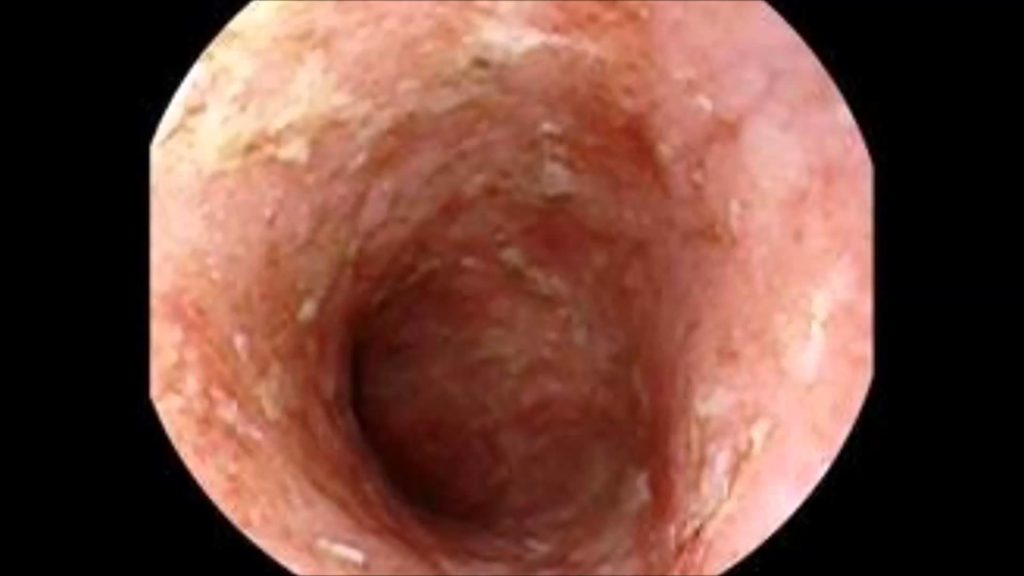Ulcerative Colitis
Ulcerative colitis is a long-term condition, where the colon and rectum become inflamed.
The colon is the large intestine (bowel), and the rectum is the end of the bowel where stools are stored.
Small ulcers can develop on the colon’s lining, and can bleed and produce pus.
Symptoms of ulcerative colitis
The main symptoms of ulcerative colitis are:
recurring diarrhoea, which may contain blood, mucus or pus
needing to empty your bowels frequently
You may also experience fatigue (extreme tiredness), loss of appetite and weight loss.
The severity of the symptoms varies, depending on how much of the rectum and colon is inflamed and how severe the inflammation is. For some people, the condition has a significant impact on their everyday lives.
Symptoms of a flare-up
Some people may go for weeks or months with very mild symptoms, or none at all (known as remission), followed by periods where the symptoms are particularly troublesome (known as flare-ups or relapses).
During a flare-up, some people with ulcerative colitis also experience symptoms elsewhere in their body. For example, some people develop:
painful and swollen joints (arthritis)
areas of painful, red and swollen skin
irritated and red eyes
In severe cases, defined as having to empty your bowels six or more times a day, additional symptoms may include:
shortness of breath
a fast or irregular heartbeat
a high temperature (fever)
blood in your stools becoming more obvious
In most people, no specific trigger for flare-ups is identified, although a gut infection can occasionally be the cause. Stress is also thought to be a potential factor.
Read more about living with ulcerative colitis.
When to seek medical advice
You should see your GP as soon as possible if you have symptoms of ulcerative colitis and you haven’t been diagnosed with the condition.
They can arrange blood or stool sample tests to help determine what may be causing your symptoms. If necessary, they can refer you to hospital for further tests.
Read more about diagnosing ulcerative colitis.
If you’ve been diagnosed with ulcerative colitis and think you may be having a severe flare-up, contact your GP or care team for advice. You may need to be admitted to hospital.
What causes ulcerative colitis?
Ulcerative colitis is thought to be an autoimmune condition. This means the immune system – the body’s defence against infection – goes wrong and attacks healthy tissue.
The most popular theory is that the immune system mistakes harmless bacteria inside the colon for a threat and attacks the tissues of the colon, causing it to become inflamed.
Exactly what causes the immune system to behave in this way is unclear. Most experts think it’s a combination of genetic and environmental factors.
Who’s affected?
It’s estimated that around 1 in every 420 people living in the UK has ulcerative colitis; this amounts to around 146,000 people.
The condition can develop at any age, but is most often diagnosed in people from 15 to 25 years old.
It’s more common in white people of European descent (especially those descended from Ashkenazi Jewish communities) and black people. The condition is rarer in people from Asian backgrounds (although the reasons for this are unclear).
Both men and women seem to be equally affected by ulcerative colitis.
How ulcerative colitis is treated
Treatment for ulcerative colitis aims to relieve symptoms during a flare-up and prevent symptoms from returning (known as maintaining remission).
In most people, this is achieved by taking medication such as:
- aminosalicylates (ASAs)
- corticosteroids
- immunosuppressants
Mild to moderate flare-ups can usually be treated at home. However, more severe flare-ups need to be treated in hospital to reduce the risk of serious complications, such as the colon becoming stretched and enlarged or developing large ulcers. Both of these can increase the risk of developing a hole in the bowel.
If medications aren’t effective at controlling your symptoms, or your quality of life is significantly affected by your condition, surgery to remove your colon may be an option.
During surgery, your small intestine will either be diverted out of an opening in your abdomen (known as an ileostomy), or used to create an internal pouch that’s connected to your anus (known as an ileo-anal pouch).
- Anus
- The anus is the opening at the end of the digestive system where solid waste leaves the body.
- Chronic
- Chronic usually means a condition that continues for a long time or keeps coming back.
- Disease
- A disease is an illness or condition that interferes with normal body functions.
- Genetic
- Genetic is a term that refers to genes- the characteristics inherited from a family member.
- Inflammation
- Inflammation is the body’s response to infection, irritation or injury, which causes redness, swelling, pain and sometimes a feeling of heat in the affected area.
- Pain
- Pain is an unpleasant physical or emotional feeling that your body produces as a warning sign that it has been damaged.
- Remission
- Remission is when the symptoms of a condition are reduced (partial remission) or go away completely (complete remission).
- Stools
- Stool (also known as faeces) is the solid waste matter that is passed from the body as a bowel movement.
- Ulcers
- An ulcer is a sore break in the skin, or on the inside lining of the body.
